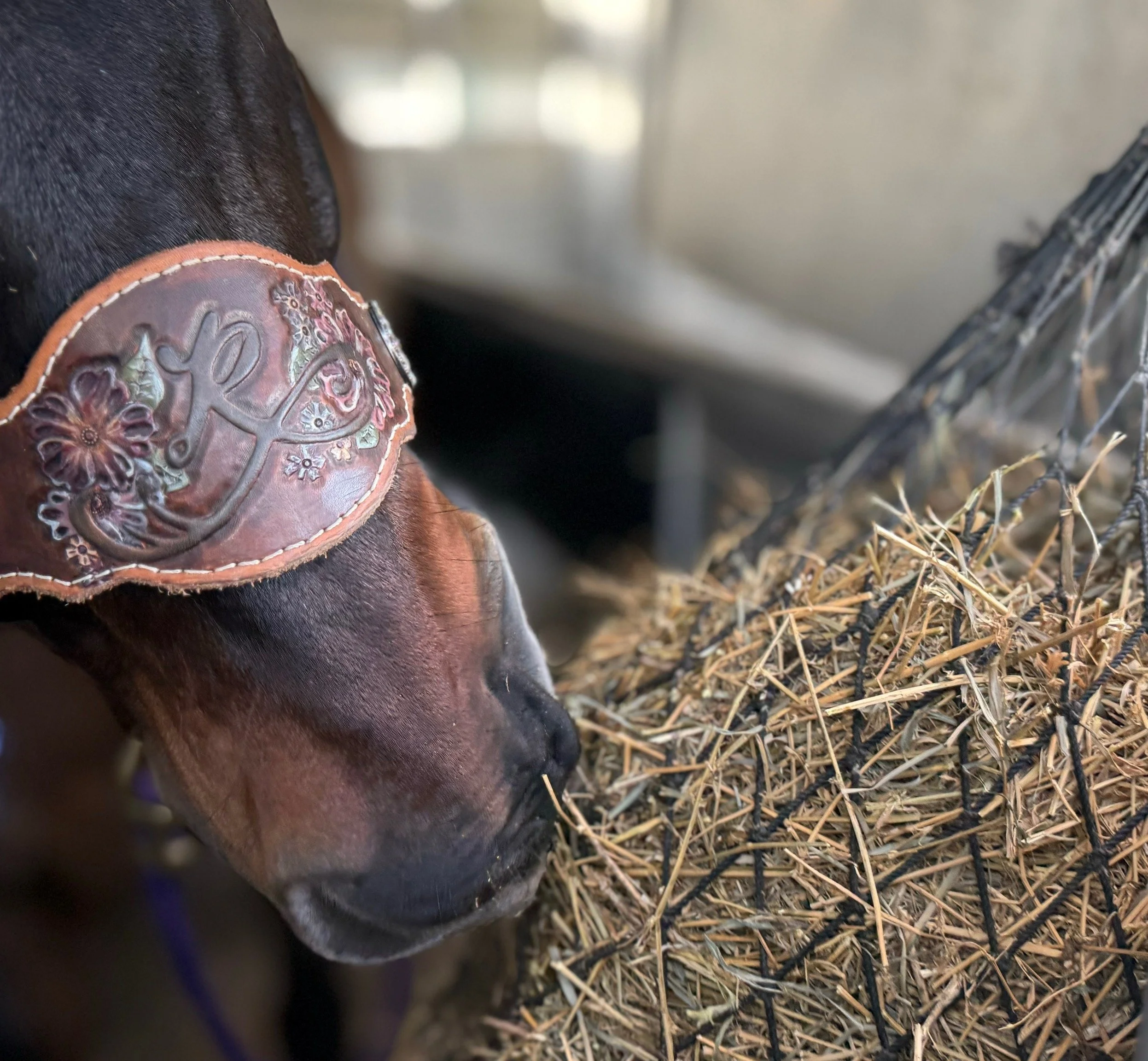Calm, Fed, & Ready
Keeping Horses Comfortable and Content While Traveling
In my last post on horse and rider comfort, we explored how the right equipment can make both feel safe and balanced. But true comfort doesn’t stop at the surface — what’s inside the horse matters just as much, especially when we’re on the move.
The Overlooked Need
We all know that horse that just doesn’t travel well. The one that paws the trailer hub caps off or steps off the trailer a sweaty mess, maybe the one that refuses to even step a hoof inside. What if the cause wasn’t a distaste for travel but an inherent need that isn’t being met?
Our horse’s need for forage doesn’t pause just because we’ve hit the road — whether it’s to a trail, a show, or the vet. Too often, I see well-meaning owners overlook this simple truth. Horses spend hours standing tied, hauled, and worked with nothing to eat. We think to offer shade and soft footing, but true comfort extends beyond what’s under their hooves — it’s also about how we care for the inside of our horses.
Personally, I’ll always take the calm, collected horse over the anxious, fretful one — especially when the difference can come down to something as simple as consistent forage.
How the Horse’s Digestive System Works
Horses produce stomach acid around the clock, 24/7. After a meal, their stomachs empty in 20-30 minutes. Constant forage helps buffer that acid and keeps digestion steady. Without it, acid builds, discomfort sets in, ulcers develop, and tension rises. With those things come emotional distress and the outward behaviors that reflect it.
Common Modern Habits That Work Against the Horse
I’ve always worried about my own horses on long, all-day trail rides — even though I never haul without hay in front of them. Too often, I see horses go all day with no grazing breaks, tied for hours before or after a ride without hay, or trailered with an empty stomach. Show days can be even worse, when feeding routines go completely off track.
No matter where we go — trail, show, vet, or anywhere in between — our horses’ digestive systems never stop working. They always need something to buffer them, to keep that steady flow of forage moving and their minds at ease.
Emotional & Physical Effects of Hunger
Hunger and the discomfort of excess stomach acid both heighten anxiety — something we often misread as “bad behavior.” Such behavior shows itself through learned helplessness, dancing, pawing, or that powerful, desperate attempt to grab a mouthful of grass while walking past a patch. These are not defiant acts — they’re quiet cries for relief.
And that same discomfort doesn’t just stay in the mind; it seeps into the body. A lack of forage affects far more than just the digestive system. It influences muscle function, focus, energy production, and willingness. Horses cannot separate physical comfort from mental peace — everything is connected. When their stomachs sit empty for hours, their brains shift toward survival mode, triggering fight-or-flight responses that show up as tension, agitation, or lack of focus.
If we want calm, willing, and content horses — whether at a show, trail, or vet visit — one of the simplest and most impactful things we can do is keep forage consistently available.
Stewardship in Motion
The easiest and most effective way to help our horses stay calm, willing, and ready to perform is to always offer hay — even if they don’t touch it.
Use slow-feed nets in trailers and at events to keep things tidy yet available. Don’t worry — the risk of flying particles can be minimized by hanging nets slightly lower and behind their heads. Horses are remarkably adept at keeping debris out of their eyes and airways, and the benefits far outweigh the risk.
When on the trail all day, take advantage of grass patches along the way. The added time is well worth it — your horse will stay more relaxed and capable throughout the ride.
It may sound a little over the top, but I even bring water from home in a large container for familiarity, since many horses prefer it. I’d rather go to the trouble and have a hydrated horse than risk colic.
Horses thrive on routine, so when we travel, keeping things as consistent as possible helps ease their minds. Constant access to forage acts as a major safety net — pun intended!
After all, we wouldn’t head to an all-day outing without snacks and water. We shouldn’t expect our horses to carry us all day without energy and fuel either.
When we meet their most basic needs, they meet us with peace. I’m often complimented at shows for how calm my horses are — and I can give the credit easily to one simple thing: consistently meeting their needs, wherever we go.
Feeding is an Act of Faith
Stewardship means tending to what God has made — body and soul — in the way He intended. In Matthew 6:11, Jesus says, “Give us today the food we need.” Just as He provides for us daily, we are called to provide for those placed in our care.
“The righteous care for the needs of their animals,
but the kindest acts of the wicked are cruel.”
When we place our own preferences above our Father’s design for His creation, we dishonor Him. Our horses never stop producing acid — and we never stop being responsible. To love them well is to feed them well, wherever we go.
When we meet their God-given needs, we do more than calm their bodies — we honor the One who entrusted them to us.

